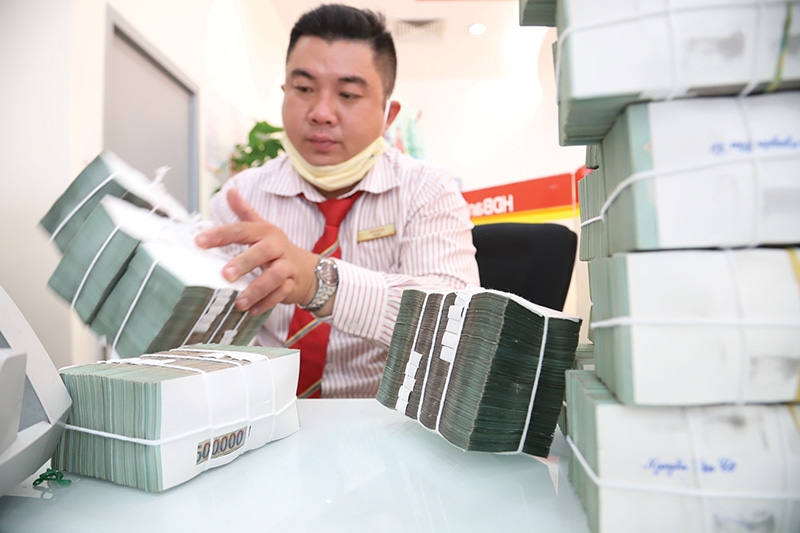US and Vietnam agree on currency blueprint
 |
| The SBV safeguards monetary and foreign exchange markets, Photo: Le Toan |
The US Treasury Department and the State Bank of Vietnam (SBV) reached the agreement last week to address the Treasury’s concerns about Vietnam’s currency practices.
Previously in April, the Biden administration reversed the US Treasury Department’s decision from December 2020 to label Vietnam a “currency manipulator”. That reversal effectively eliminated the risk that the US will impose stiff tariffs on Vietnam for the time being.
The Treasury highlighted that Vietnam is making efforts to further modernise and make more transparent its monetary policy and exchange rate framework. In support of this, the SBV will continue to improve exchange rate flexibility over time, allowing VND to move in line with the stage of development of the financial and foreign exchange markets and with economic fundamentals while maintaining macroeconomic and financial market stability.
The SBV will continue to provide necessary information for the Treasury to conduct a thorough analysis and reporting on the SBV’s activities in the foreign exchange market in the Treasury’s semiannual report to Congress on the macroeconomic and foreign exchange policies of major trading partners of the United States.
The Treasury will inform other US government agencies that it has reached an agreement with the SBV to address the Treasury’s concerns about Vietnam’s currency practices.
US Secretary of the Treasury Janet L. Yellen said, “I believe the SBV’s attention to these issues will not only address the Treasury’s concerns but also will support the further development of Vietnam’s financial markets and enhance its macroeconomic and financial resilience.”
Meanwhile SBV Governor Nguyen Thi Hong said, “The SBV will continue to manage exchange rate policy within its general monetary policy framework to safeguard the proper functioning of monetary and foreign exchange markets, to promote macroeconomic stability, control inflation, and not to create an unfair competitive advantage.”
Hong added, “Vietnam confirms that it is bound under the Articles of Agreement of the International Monetary Foundation to avoid manipulating its exchange rate in order to prevent effective balance of payments adjustment or to gain an unfair advantage and will refrain from any competitive devaluation of VND.”
Market watchdogs believed Vietnam is a potentially important partner to the US in achieving its regional geopolitical objectives. Thus, the SBV is envisaged to encourage a gradual appreciation of the VND going forward to address the US government’s concerns about the undervaluation of Vietnam’s currency, according to VinaCapital.
“In our previous assessment, we believe that the SBV by means of bilateral negotiation can explain and minimise the risk of Vietnam being labelled a currency manipulator. Accordingly, we maintain the forecast that the exchange rate shall fluctuate in a tight band of ±0.5 per cent. We have already included the assumption that the greenbacks appreciate against other strong currencies this year,” said Tran Minh Hoang, head of Research at Vietcombank Securities.
In a broader view, with the stable foreign exchange market along with well-controlled inflation, the SBV shall have more room to manoeuver to achieve the target of lower lending rates to support individuals and businesses to weather the storm.
According to the UK-based Standard Chartered Bank, rising inflation reduces the likelihood of further interest rate cuts. Standard Chartered does not expect rate hikes despite improving economic and credit growth since the fourth quarter of last year.
Standard Chartered recently lowered its USD-VND forecasts to 22,900 at the end of Q3-2021 (from 23,100) and to 22,850 at the end of the year (23,000).
Tran Duc Anh, head of Macro and Strategy at KB Securities, predicts that the exchange rate should remain stable in the last six months of 2021. Specifically, the supply of USD should remain ample thanks to foreign investment inflows and remittances, while the recent actions of the SBV switching from buying foreign currencies to buying for a six-month term show that it will limit the amount of USD purchased compared to the previous period.
“The risk of an increase in the exchange rate may appear in the scenario in which the Fed announced the reduction of the monthly asset purchase programme, sending out signals about accelerating interest rate hikes under inflationary pressure in August or at the September policy meeting,” Anh told VIR.
“If this happens, the dollar is likely to rise and reverse the downtrend that started at the end of March 2020, which will put more depreciation pressure on the VND. However, at the moment, we believe this case is unlikely as inflation in the US is only temporary and will soon cool down in the near future without the Fed’s intervention.”
What the stars mean:
★ Poor ★ ★ Promising ★★★ Good ★★★★ Very good ★★★★★ Exceptional
Latest News
More News
- Cashless payments hit 28 times GDP in 2025 (February 04, 2026 | 18:09)
- SSIAM and DBJ launch Japan Vietnam Capital Fund (February 04, 2026 | 15:57)
- Banks target stronger profits, credit growth in 2026 (February 04, 2026 | 15:43)
- Vietnam on path to investment-grade rating (February 03, 2026 | 13:07)
- Consumer finance sector posts sharp profit growth (February 03, 2026 | 13:05)
- Insurance market building the next chapter of protection (February 02, 2026 | 11:16)
- NAB Innovation Centre underscores Vietnam’s appeal for tech investment (January 30, 2026 | 11:16)
- Vietnam strengthens public debt management with World Bank and IMF (January 30, 2026 | 11:00)
- Corporate bond market poised for stronger growth cycle (January 28, 2026 | 17:13)
- Vietnam's IPO market on recovery trajectory (January 28, 2026 | 17:04)

 Tag:
Tag:














 Mobile Version
Mobile Version